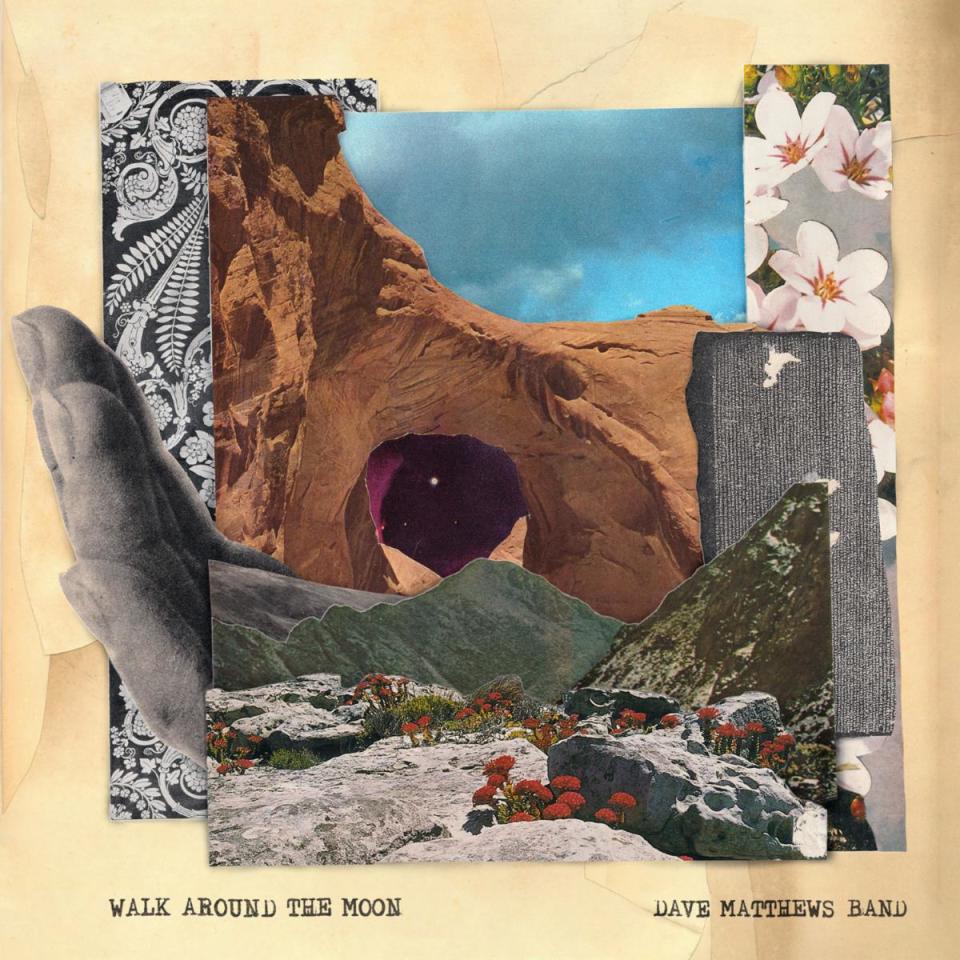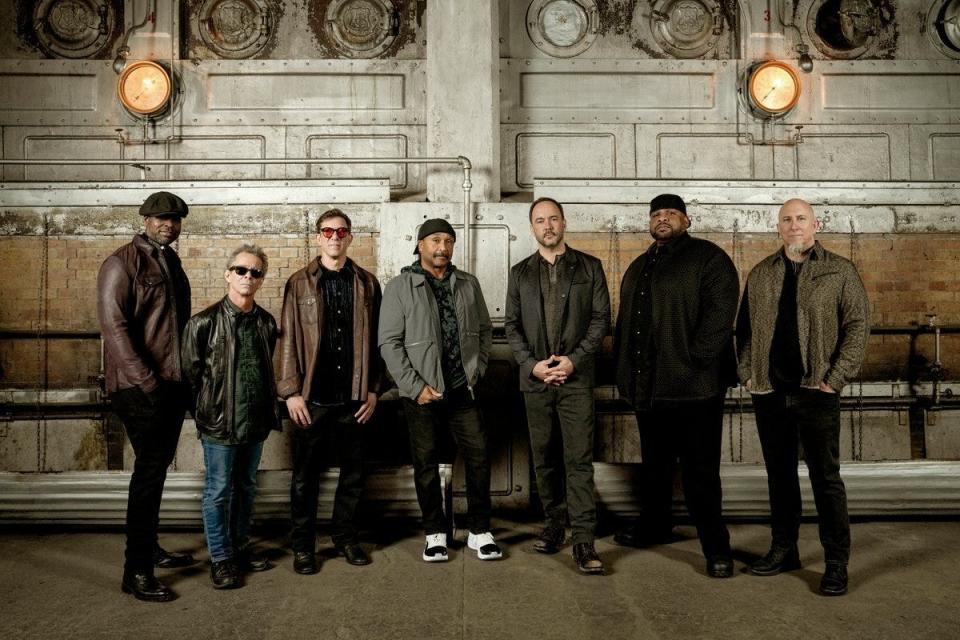Dave Matthews doesn't want to be afraid of 'my children being murdered at school'
Dave Matthews is a thoughtful guy.
He’s funny. He’s insightful. He gets angry at injustices. He cares.
He’s also the backbone of one of the most enduring jam rock bands of the past 30-plus years. The Dave Matthews Band possesses the rare capability of weaving quirky musical cornucopias such as “Ants Marching,” “Too Much” and “Two Step” – the soundtrack to many a backyard hacky sack competition – with whispery love songs (“Crash Into Me”) and ominous social commentary (“Don’t Drink the Water”).
On Friday, Matthews, 56, and bandmates Carter Beauford (drums), Stefan Lessard (bass), Tim Reynolds (guitar), Rashawn Ross (trumpet), Jeff Coffin (saxophone) and Buddy Strong (keyboards) drop “Walk Around the Moon,” the 10th studio album in the DMB oeuvre.

Written primarily during the pandemic in the band’s home base of Charlottesville, Virginia, songs including “Madman’s Eyes” and “Monsters” shudder with relevancy.
In conversation over Zoom, Matthews’ intensity is balanced by his smart humor as he discusses DMB’s annual summer marathon that launches Friday in Texas, the science of the band’s set lists and why gun violence is on his mind.
Question: I get the feeling that when you’re not on the road, you’re like a racehorse in the starting gate, waiting for it to fling open. Would that be accurate?
Answer: I like the road. I don’t mind traveling and we travel very well. When I’m off the road maybe there was a time I was chomping at the bit. But I love being home and drawing, hanging with family. I love the peace of that. But I have a job and it’s a good job if we’re getting paid to bring joy to people.
Your shows are regarded for giving fans something a little different each time. When do you start working on the set list?
I’m a little bit crazy. I like to look at the sets we’ve played in that venue or around that city in the last three or four years. I try and write a set that takes history into account and also try to play songs people know. I try not to play “Ants Marching” every night, but it shows up more often than not. We have a handful of songs that people are more familiar with so I feel you should have a few of those in the show. I think of them like a palate cleanser in a funny way. I’d love to start a tour and have a set list written, but I don’t think we could survive it. That’s a different gift, like putting on a Broadway play. I think we’d be bored and the audience would start throwing things at us.
You have always been cognizant of reducing your environmental footprint when touring. Are there any new practices with environmental organization Reverb on this upcoming tour?
Recycling is a big part of our touring machine. Of recycled plastic, 95% winds up in landfills, but let’s keep trying to figure it out. I want brilliant minds to figure out what we can use old plastic bottles for and while we figure that out, let’s move from plastic and try to go to glass bottles. Why don’t we just keep trying?
So many people complain about pricing and access with concert tickets. You’ve sold more than 25 million tickets over the years with few issues. What’s the secret?
What we did is try to limit the number of tickets you can buy on a single credit card; get tickets to the fans first. Anything we can do to make it more difficult for people who are only trying to make money. We’ve been trying to battle it because we don’t want to piss off our fans. (Laughs) There’s only, like, 25,000 fans and they just follow us around the country, so crossing them would be bad business.
This is your first new album in five years and the songs reflect our current times. What is the backstory in “Madman’s Eyes” with the lyric, “Is it really so hard to do what we know is right/To protect the things that we hold dear/ Must we do things that we should never forgive”?
It’s another way of saying the end justifies the means. I’m so stunned by the ability of our leaders to be able to convince us that we’re powerless in the face of gun violence and that the vulnerability of innocent people in this country is a sacrifice we have to make if we want to be truly American. It’s so mind bogglingly cruel. It’s insanity. I have no idea how people can stand up and say it’s “not guns” and “it’s not the NRA,” it’s just mental health. And then do nothing to address the fact that from the ‘80s we’ve closed every mental health institution we can in this country.

You sound very passionate about this.
I have many friends who are guns owners, who hunt, who believe in their right to have guns in their house. But all of them would also agree that they prefer a person can’t go into a school and blow people away after buying a gun. Yet we’re going to create this fever of discord in our society so we don’t have to deal with real things. True problems like climate change. Real problems facing working Americans. No one is coming for your guns. Can we just have a conversation without mad outrage? I don’t like being afraid of my children being murdered at school. I’ve had to deal with my kids being at university when there is a shooting and they’ve lost friends. If we can just shout about weird things, politicians don’t have to sit down and figure out solutions to real issues like health care and gun violence. That kind of madness of distraction makes me crazy.
And these were all the things you thought about when writing the song?
The song kind of wrote itself. The first verse is this sort of beautiful childhood memory of innocence. It shouldn’t be possible for me to go to the local gun store, grab a gun, pop on down to a school and murder people. That should be an impossibility. That’s where the train has gone off the tracks.
On a lighter note, “After Everything” has a very jaunty, Beatles-esque feel to it. How did it develop musically?
The justification for this arrangement was thinking about (The Beatles’) “She Came in Through the Bathroom Window” and “Happiness is a Warm Gun.” Here’s one section and … now we’re going to change it! It’s a little manic, but the moment it bursts into the second section makes me very happy.
Rock on, read on:
A legacy cemented: After four decades, Def Leppard's fire is still raging
Rock & Roll Hall of Fame: George Michael, Willie Nelson, Missy Elliott land in Rock Hall on 1st try
Sammy Hagar talks: Loving fast cars, belief in alien life and missing Eddie Van Halen: 'It's such a shame'
This article originally appeared on USA TODAY: Dave Matthews Band 10th album tackles gun violence: 'Fever of discord'
